

Hezbollah has U.S. armored personnel carriers. But how did they get them? Jordanian Armed Forces M113 armored personnel carriers attack a simulated invasion force during a mission readiness exercise at the JAF’s Joint Training Center on Jan. 17.
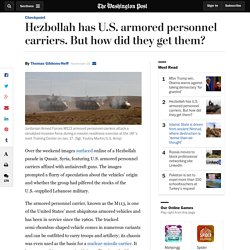
(Sgt. Youtoy Martin/U.S. Army) Over the weekend images surfaced online of a Hezbollah parade in Qusair, Syria, featuring U.S. armored personnel carriers affixed with antiaircraft guns. Israel-Palestine-Resource-Packet. Empires to Nation-States: Islamic Period, A. Holly Shissler and Erin L. Glade. 3 of 3 The large imperial model of government was replaced in the Middle East by the nation-state in a process that was shaped by a mixture of nationalist aspirations at the local level and foreign interference from European powers.
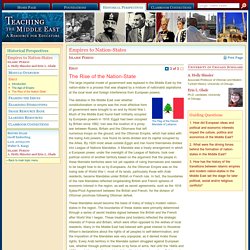
The debates in the Middle East over whether constitutionalism or empire was the most effective form of government were brought to an end by World War I. Much of the Middle East found itself militarily occupied by European powers in 1918: Egypt had been occupied by Britain since 1882; Iran was the location of a proxy war between Russia, Britain and the Ottomans that left numerous troops on the ground; and the Ottoman Empire, which had sided with the losing Axis powers, now found its lands divided and its capital occupied by the Allies.
By 1920 most areas outside Egypt and Iran found themselves divided into League of Nations Mandates. Lecture 4 — Notre Dame OpenCourseWare. — filed under: Societies, Religion, Middle East, Culture, Islamic Societies, Arabic, History, Arabic and Middle East Studies, North Africa, Islam IV.
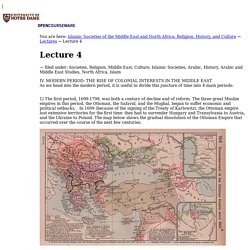
MODERN PERIOD: THE RISE OF COLONIAL INTERESTS IN THE MIDDLE EASTAs we head into the modern period, it is useful to divide this juncture of time into 4 main periods: 1) The first period, 1699-1798, was both a century of decline and of reform. PeaceMaker: Play the News. Solve the Puzzle. Parallel Realities - Resolution 242 And The Aftermath Of 1967. The argument over which side to blame for the Six Day War goes on, but all of the parties acknowledge that Israel's dramatic victory altered the face of the Middle East and established the boundaries--literally and figuratively--within which the quest for an Arab-Israeli settlement has been conducted ever since.

Territories/In the 1967 war, Israel captured the Golan Heights from Syria, the West Bank including East Jerusalem from Jordan, and the Gaza Strip and the Sinai Peninsula from Egypt. Except for the Sinai, Israel still holds all those territories. Egypt regained the Sinai as part of the Camp David Accords of 1979. Israel has formally annexed East Jerusalem and the Golan Heights, vowing never to relinquish those territories. But Syria vows never to make peace unless Israel withdraws from Golan. Population/By capturing the West Bank and the Gaza Strip in 1967, Israel also captured about one million Palestinians. » Resolution 242 The 1967 war also gave rise to U.N. Occupation. Among the most discussed long-term results of the war is Israel's administration of territories it occupied during those six days of fighting — especially the West Bank and, until Israel withdrew in 2005, the Gaza Strip.
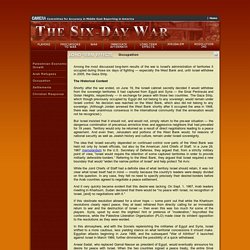
The Historical Context Shortly after the war ended, on June 19, the Israeli cabinet secretly decided it would withdraw from the sovereign territories it had captured from Egypt and Syria — the Sinai Peninsula and Golan Heights, respectively — in exchange for peace with those two countries. The Gaza Strip, which though previously occupied by Egypt did not belong to any sovereign, would remain under Israeli control. No decision was reached on the West Bank, which also did not belong to any sovereign. (Although Jordan annexed the West Bank shortly after it occupied the area in 1948, there was near unanimous consensus in the international community that the annexation would not be recognized.) And it very quickly became evident that this desire was lacking. General References.
Israel will not allow Iran to obtain nuclear weapons: Netanyahu. © Provided by AFP Israeli Prime Minister Benjamin Netanyahu chairs the weekly cabinet meeting at his Jerusalem office on January 3, 2016 Prime Minister Benjamin Netanyahu warned Iran on Sunday that Israel would not allow it to obtain nuclear weapons, after sanctions were lifted under Tehran's historic nuclear deal with global powers.
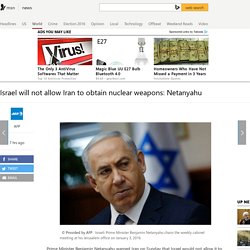
"Israel's policy has been and will remain exactly what has been followed: to not allow Iran to acquire nuclear weapons," Netanyahu said during a cabinet meeting, according to his office. Netanyahu strongly opposed the nuclear deal with Israel's arch-foe Iran and argued that it would not prevent Tehran from obtaining nuclear weapons. He has also said that the lifting of sanctions will allow Iran to further back proxy militants in the region, including Israeli enemies Hezbollah.
Israel has not ruled out military force in order to keep Iran from developing nuclear weapons, though analysts say unilateral action would be highly unlikely. Shattered Dreams Of Peace. Analysis: » An Interview with Ehud Barak FRONTLINE's interview with Ehud Barak in which he discusses Camp David. » An Interview with Yasser Arafat FRONTLINE's interview with Yasser Arafat in which he discusses Camp David. » An Interview with Saeb Erekat FRONTLINE's interview with Saeb Erekat about Camp David » "The Negotiation Strategies of Israel and the Palestinians" Gilead Sher, one of Israel's chief negotiators from 1999-2001, summarizes each sides' dramatically different political strategies and tactical approaches to the negotiations, and how Arafat was a critical obstacle throughout the peace talks.
